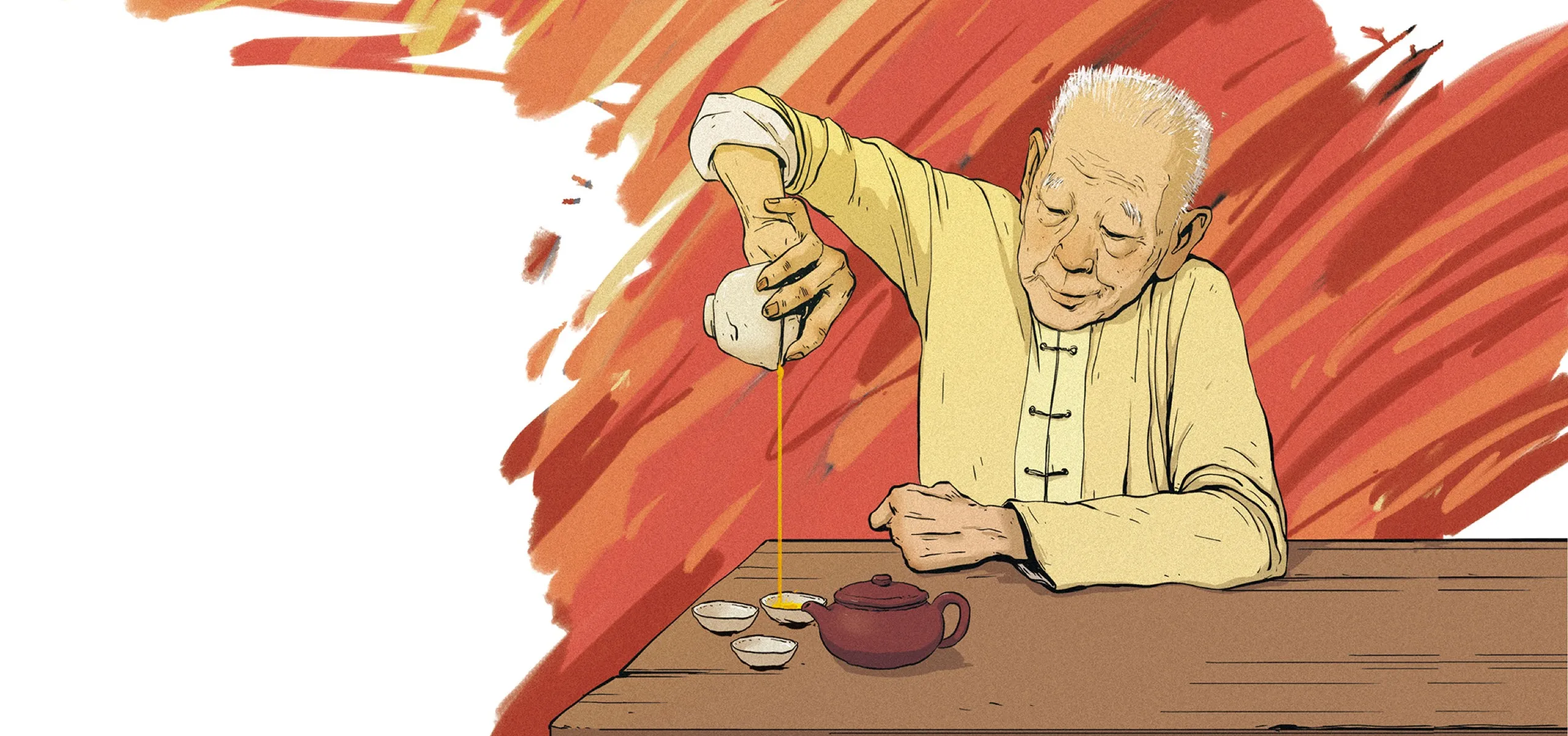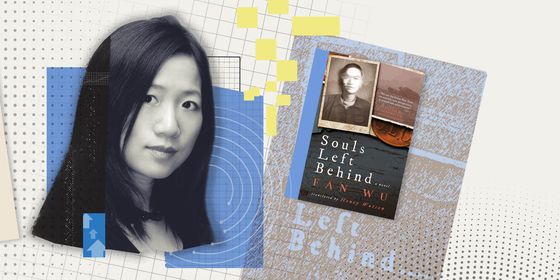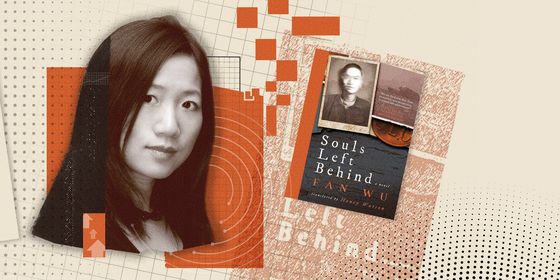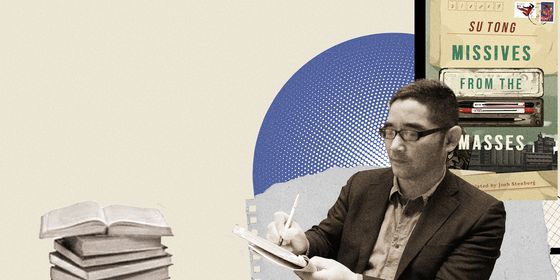Hu Yuesheng’s newly translated short story harks back to “wuxia” tales of old
The young man’s eyes bounced back and forth between the placard by the teahouse door and the address scrawled on the scrap of paper he held tightly in his hand. When he was sure they matched, he knocked. When nobody came, he let himself in. His gaze found the red-tasseled spear mounted on the wall.
A voice called from behind the young man: “Who are you looking for?”
He straightened and turned abruptly. “Master Yang!” he said.
An old man with a wispy gray beard stood among the tables. The old man’s eyes were sharp and full of life. His yellow silk robe hung over a wiry frame. There was something profound and dignified in his manner, which could not be concealed.
“Master Yang,” the young man said. “That’s who you are, right?”
The old man confirmed the surname but not the title.
The young man could not contain his excitement. “I spent months looking for you,” he said. “I went up and down these streets, searching every little alley.” Even after someone had told him the teahouse might be the place, it hadn’t been easy to find. In the jianghu—the shadow world of fighters and thieves—Master Yang was called the “Spear King of Changjie.”
When the young man asked if he had the right person, the old man simply said, “You had a rough time of it. Have a cup of tea.”
They sat down together. The table was not particularly ornate or extravagant, but the camphor wood’s patina revealed its age. The setting was simple, and in the classical style. On the wooden plank were a row of small glazed white cups, larger porcelain cups, and a clay teapot. A copper kettle was heating on the charcoal brazier in the corner of the table. Droplets of water spat out of the rim of its lid and trickled down the design cast in the side of the kettle, so it looked like it was sweating in the heat.
Master Yang lifted the kettle from the stove, cradling the handle in a rag. He set it on a cushion beside the service.
“The water has to cool down a bit,” Master Yang said. “It should not be boiling. Just eighty to ninety percent of the way there is enough. If it’s too hot, the leaves will not bloom. They won’t give up their flavor.”
The young man had never considered making tea a task that required much skill. It was far more complicated than he had ever imagined.
Master Yang poured water over the tea leaves he had added to one of the larger porcelain cups. He paused when he heard the young man make an almost imperceptible grunt.
“What’s on your mind?” Master Yang asked.
“Master Yang,” the young man said, “I mean...I wanted to know, in the jianghu, fighting your way up against all these masters, each with their own special skill—I mean, that must be really cool, huh?”
Master Yang ignored him. He put a lid over the porcelain cup and strained the water through it, dumping it on the floor.
The young man thought he had offended Master Yang. “What are you doing?” he asked.
“I’m washing the tea,” Master Yang said.
“Why would you need to wash tea?” the young man asked.
“As they grow, the tea leaves are buffeted by the wind and rain,” Master Yang said. “They gather the dust of the world around them. It has to be washed away.”
The young man nodded, silently cursing himself for revealing his ignorance.
Master Yang poured more water into the cup, put the lid on again and let it steep. After a while, the old man picked up the larger cup, tilted it slightly, and sent tea gently cascading through the strainer and into the small vessel. It caught the sunlight as it fell, glowing like a ribbon of gold. The motions of the old man’s wrinkled hands and thin wrists were steady and sure. The cup was held absolutely still in his hand, without the slightest tremor.
“Your wrists must be so strong,” the young man said with a sigh. “How long do you have to practice to be able to do that?”
“All you have to do is drink tea,” Master Yang said, “three times a day, for about fifty years. After that, anyone could master it.”
“Right, right, right,” the young man said.
The young man leaned forward with his elbows balanced on his knees. His shoulders dropped. After a moment, he caught himself and sat upright. He still struggled to contain his excitement. He felt sweat trickling down his back. He was surer than ever that the Master had otherworldly abilities. But it all kept coming back to tea. The young man tried to put it together. He decided that must be how people of this level of cultivation talked. Master Yang was concealing his power. He appeared to be making idle conversation, but there was deep meaning. There were mysteries concealed in these simple remarks. The young man had heard that true masters knew how to restrain themselves, never revealing their abilities until absolutely necessary. Even once the fight begins, a true master holds back. They retreat. They fall back and let you advance, analyzing your movements. They size up the situation with complete clarity. The true master might appear to be shaken, but, when they finally strike, they will put you to shame.
The young man tried to calm his racing thoughts and focus. If Master Yang chose tea as the metaphor for his teachings, then the young man knew he must concentrate on the process.
While the young man tried to figure out all of these things, Master Yang had finished preparing the tea. He pushed a small cup toward the young man. “Please,” Master Yang said, gesturing at the cup.
The young man did not want to risk hesitation. He picked up the cup. He held it up to inspect it. The liquid in the cup was a faint crimson and gave off a delicate aroma. He took a sip. The flavor was subtle but impressive.
“How is it?” Master Yang asked.
“It’s pretty good,” the young man said. “To be honest, I don’t know much about tea. This is black tea, right?”
He took another sip of the tea and lowered his head, ashamed of having exposed his ignorance again.
Master Yang poured water over the tea again. He poured a second cup for the young man. “Try it again,” he said.
The second brew was golden red. The young man took a sip. The flavor had mellowed, the young man thought, but he worried that he couldn’t taste much of a difference beyond that. He raised the cup again and stole a glance at Master Yang over the rim. The old man was absorbed in his tea. He tilted his head back and slurped noisily. The tea squirted into his mouth, like a bubbling spring.
The young man came to a realization: The reason that he couldn’t detect any difference in the second brew was because he was trying too hard to find the difference. There was a lesson being taught in the tea tasting, the young man thought to himself. The immature mind loves to make comparisons where none should be made. But that causes you to lose your focus and become incapable of achieving anything.
“Amazing,” the young man said. “I finally get it.”
Master Yang cast a skeptical look at him. He was not sure what the young man was getting at. He picked up the porcelain cup and prepared the third brew.
The young man gathered his thoughts and raised the cup to examine the color. This brew was darker. It gave off almost no aroma. He took a sip. The taste of the tea leaves overwhelmed all other flavors in the cup. He put down the cup with a sigh of satisfaction. He looked up at Master Yang. “It’s much more bitter,” he said.
On the third brew, the flavor of the tea leaves themselves was more pronounced, but it was accompanied by much more bitterness. It is like the experience of human life, the young man thought to himself. The process symbolizes a man who has accomplished a few things entering middle age. The first two brews represented the younger years. The young man couldn’t help but think of himself, wandering in ignorance, asking after this master and that school, worried about finding the correct path. But drinking the tea, he had realized that he was still young enough that he had no need to worry. Youth was a time of infinite possibilities.
By the time he picked up the cup filled with tea from the fourth brew, the young man felt as if he had mastered the tasting process. He examined the color of the tea, tasted it on his tongue, swallowed, then savored the aftertaste.
The bitterness was gone. The delicate aroma of the first brew returned. The flavor of the tea leaves was just right. The young man drank two cups. It was like a spring breeze. Returning to his metaphor of the course of a lifetime, he imagined an old man walking out of the mountains after a decade in seclusion. The unassuming old man was dressed in rough clothes, but striding confidently back into the world, a spear held in front of him. Back among the hustle and bustle of human society, the man slowly raised his eyes to take it all in. His pupils were crystal beads that converge beams of light. His gaze penetrated through the heat of battle and through all emotion, staring directly at the banner of the most powerful fighter under heaven.
The fifth brew of tea was rust red. The flavor had faded. The man that had walked out of the mountain was standing in the ring; the battle ended, the onlookers stunned, his skills proved. With one hand, the man held up his banner, and with the other, he held a young maiden. His spear was strapped across his back. From that moment forward, he descended into the underworld and became a notorious wanderer, accompanied only by his weapon. His suit of armor and his skin seemed to be fused together. He traveled on clear nights on a path lit by the moon. He had bested all of his competition. He was in a state of martial perfection. If anybody saw his long shadow as dusk approached, they might mistake him for a god. Word would spread. One story would become ten, multiplying over time, until he became another legend of the jianghu.
The name would echo down through the years—the Spear King of Changjie!
But on the sixth brew, the Spear King of Changjie put down his weapon. He took shelter in his dim quarters, keeping to himself. He had the air of someone retreating from pain. People came and went from his door, but he never rose to greet them. It was hard to say whether he was mourning the departure of someone close to him—or perhaps waiting for someone’s arrival. But as long as he waited, nobody came. He remained in the shadows. He made sure that his face stayed hidden, just like the flavor of the tea, like the bud clipped from the branch, like the frost spreading across the ground, like the soul slipping from the body.
The young man was overcome with a wave of nausea. He had to put down his cup. Master Yang looked up. “What’s wrong?” he asked.
The young man shook his head. “I’ve had enough,” he said.
Master Yang studied him, then raised the kettle again. Without speaking, he began pouring water into the cup.
“Master Yang,” the young man said, “how many times can you brew this tea?”
“First grade yancha? Seven times.”
“The last brew just tastes like water, right?” the young man asked.
Master Yang took the young man’s cup. He poured in the tea and pushed it back toward him. “Try it,” he said.
The young man looked down at the cup. The tea was a pale yellow, as if it had been colored by a single drop of blood. His mind cleared. He leaned in close to the cup, trying to smell the faint aroma. The young man wasn’t sure whether what was in his cup should be called tea or tea-flavored water. He put the cup to his lips and felt the heat of the porcelain rim. He took a gentle slurp.
The warm liquid slipped into the young man’s stomach. Warmth spread throughout his body. He felt as if he had swallowed a seed that was germinating inside of him. A flower bloomed. Branches grew. The delicate fragrance of green leaves clung to the inside of his nostrils. A tea tree grew inside of him. The young man opened his eyes. He saw the spear, set against the blank white of the wall. The tassel seemed alive with flame. The iron tip gleamed like silver.
The Spear King of Changjie stood in front of his weapon, his back turned to the table. In his yellow silk robe, he looked every inch the legend that the young man imagined.
The Spear King asked the young man why he had come in search of him. The young man answered that he was looking for a master. He said that he wanted to learn martial arts. The Spear King asked him why. The young man said that it was because he liked hearing about the legends of the jianghu.
The young man said that he wanted to go into the jianghu. He wanted to earn a living by his blade, fighting his way through the underworld. He wanted to learn to fight, to destroy evil and promote good, to save the dying and help the sick. He wanted to roam free with the woman he loved. He wanted to understand the mysteries of the human realm. He wanted to achieve enlightenment. He said all of this. He couldn’t hold back any longer. The young man collapsed to the ground, bowing to the Spear King, and knocking his forehead against the floor. He begged the Spear King to accept him as a disciple and teach him what he knew.
Master Yang studied him for a moment and then told him to get off the ground.
“So you promise?” the young man asked.
“Promise what?” Master Yang asked.
“Promise to take me as a disciple,” the young man said.
“When did I say that?”
The young man crawled to the feet of Master Yang. “If you don’t want me as a disciple,” he said, “why did you drink tea with me? Why did you teach me that stuff?”
Master Yang went to the window, pulled up the bamboo blind, and looked outside. The sky was clear. The streets of the small town were unchanged. Not too far away, two girls were leaning against a bus stop, looking down at their phones. One was playing a game and the other watching a TV show. Further down the street, two boys were harassing a blind beggar. One of the boys picked up the beggar’s stainless-steel bowl and slapped it down over his head.
Out in the world, everyone was busy with their own affairs. A man rushed by, talking on the phone about his wedding reception: how many tables they needed, how many guests to invite...After that, the topic turned to condo prices and school districts. It devolved into an argument. The man turned red in the face. He went into a restaurant. In the doorway, a man and a woman were saying goodbye to each other. The woman was his boss. As they talked, the man seemed to subconsciously bow his head to her. What were they talking about? Work, probably, or promotions. A bus rumbled past them, full of people just getting off work. They stood, pressed in together. A few of them were looking around, glancing at the world passing by outside, but most were absorbed in their phones. The wheels on the bus kept rolling, rolling, from one station to the next.
Master Yang lowered the blind. He shook his hand, dismissing the young man.
“What is all this about jianghu and Spear King? What era are you living in? Do you see anything like that out there? I asked you to drink tea because I wanted someone to drink tea with. I just want to pass the time.”
He laughed.














